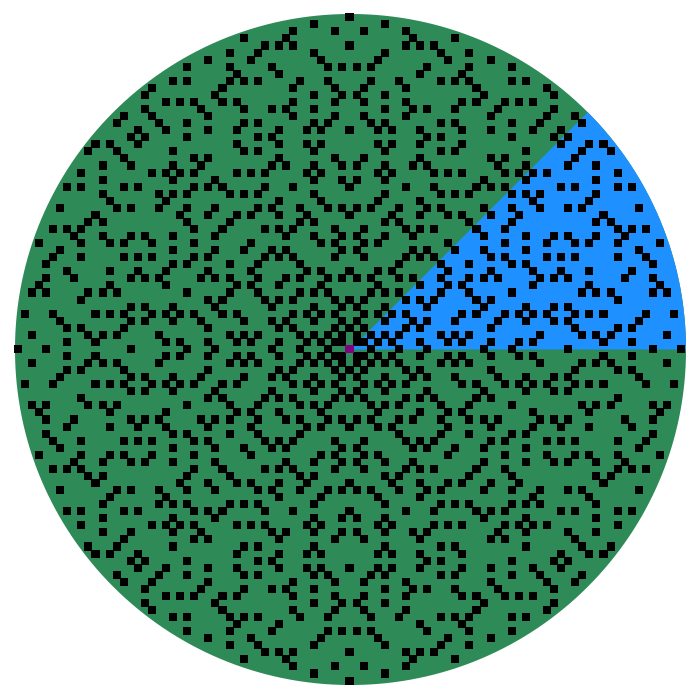| Lecture |
Date |
Topic(s)
| Comments/ABET |
Reading |
Assignment, Quiz, and Exam Schedule |
| One |
17 and 19 January |
Introduction to Number Theory |
Vocabulary and Definitions; Mathematica demo |
Chapter 1.1-1.5, 2.1-2.3 and class notes |
Homework problems are in this week's mathematica notebook |
| Two |
24 and 26 January |
Vocabulary and Definitions, continued |
Primes and greatest common divisor |
Chapter 3.1 and 3.2. Class notes. |
For Undergraduates Only: Prerequisite Assessment Quiz Due on Monday by 11:59pm. The quiz is online and can be found on canvas under Course Summary. |
| Three |
31 January and 2 February |
GCD, Euclidean Algorithm, Fundamental Theorem of Arithmetic
|
|
Chapter 3.3, 3.4, and 3.5 and class notes
| Quiz 1 due on Tuesday by 12:30pm on canvas: with your team, open book, open notes, open internet, open friends. You and your team should write up should write up solutions together (your own work!) and upload one quiz for the entire team. Homework problems are contained in the mathematica notebook |
| Four |
7 and 9 February |
Fermat Numbers, Congruences, Chinese Remainder Theorem |
Homework problems are contained in the mathematica notebook |
3.6, 4.1, 4.2, 4.3 and class notes |
|
| Five |
14 and 16 Feb |
Wilson's Theorem, Fermat's Little Theorem, Pollard Factoring Method |
ABET: Problem 2 on quiz 2--last digit of expansion + induction |
6.1 and class notes |
Quiz 2 due on Tuesday by 12:30pm on canvas: with your team, open book, open notes, open internet, open friends. You and your team should write up should write up solutions together (your own work!) and upload one quiz for the entire team. Homework problems are in this week's Mathematica notebook |
| Six |
21 and 23 Feb |
Pseudoprimes, Euler's Theorem (generalizes Fermat's Little Theorem), Euler's phi function
|
|
6.2, 6.3, 7.1 through example 7.4 |
Quiz 3 is due on Tuesday at 12:30pm and covers material through 6.1; Upload on canvas with your team, open book, open notes, open internet, open friends. You and your team should write up should write up solutions together (your own work!) and upload one quiz for the entire team. The next batch of homework problems are in this week's mathematica notebook |
| Seven |
28 Feb and 2 March |
Perfect Numbers, Mersenne Primes, Cryptography |
Main topic is public key cryptography, particularly RSA |
8.1, 8.3 (not covered in class, but useful to know), 8.4 (RSA) and class notes |
Grad Student Team Project Proposal Due as an Upload on Canvas on Tuesday |
| Eight |
7 and 9 March |
Midterm (Tuesday) plus the Diffie-Hellman Key Exchange, Playing Poker over the phone, Secret Sharing Schemes (Tuesday) |
read 8.6 for Tuesday and the midterm exam is on 7th March in North classroom 1202 from 3:30-4:45pm. |
The midterm will cover material up through 7.3 in the Mathematica notebook "NumberTheoryWeek7_Part1" |
The Midterm Exam is in class, in person, without your team, on Tuesday 7 March 3:30-4:45pm in North Classroom 1202. You may bring two pages of notes (8.5" x 11") on both sides and calculators are allowed. Do not hand in the notes. |
| Nine |
14 and 16 March |
Another Threshold Scheme, Primitive Roots, Discrete Log Problem, and ElGammal Encryption |
Alternative approaches to these topics are given in this week's Mathematica notebook |
9.1-9.4 and class notes |
|
null |
19-25 March |
Spring Break: no classes, no office hours |
| | |
| Ten |
28 and 30 March |
Topic |
ABET: Quiz 4 problem 3 (RSA computation) |
TBA |
Quiz 4 is due on Tuesday by 12:30pm on canvas: with your team, open book, open notes, open internet, open friends. You and your team should write up should write up solutions together (your own work!) and upload one quiz for the entire team. The next batch of homework problems are in this week's mathematica notebook. |
| Eleven |
4 and 6 April |
Elliptic Curve Cryptography |
|
Class notes |
Twelve |
11 and 13 April |
Quadratic reciprocity |
ABET: Quiz 5 problem 2 (elliptic curve cryptography) |
9.4 (again), 11.2, 11.2, and class notes |
Quiz 5 is due on Tuesday by 12:30pm on canvas: with your team, open book, open notes, open internet, open friends. You and your team should write up should write up solutions together (your own work!) and upload one quiz for the entire team.
| Thirteen |
18 and 20 April |
|
|
Lecture slides and videos on canvas |
|
| Fourteen |
25 and 27 April |
Grad student video presentations to be uploaded on canvas on Tuesday. |
Grad student video presentations |
Lecture slides and videos on canvas |
|
| Fifteen |
2 and 4 May |
Tuesday FINAL EXAM |
Tuesday 2nd May, Exam 2. The Final Exam is comprehensive and will include material from the week 12 Mathematica notebook on quadratic reciprocity. |
|
The Final Exam is in person without your team on Tuesday 2 May from 3:30-4:45 in North Classroom 1202. Calculators and two sheets (8.5x11 inches, both sides) of notes allowed. Do not hand in the notes. |
| Sixteen |
Week of 10 May |
Monday office hours to be determined. |
|
|
|
|

